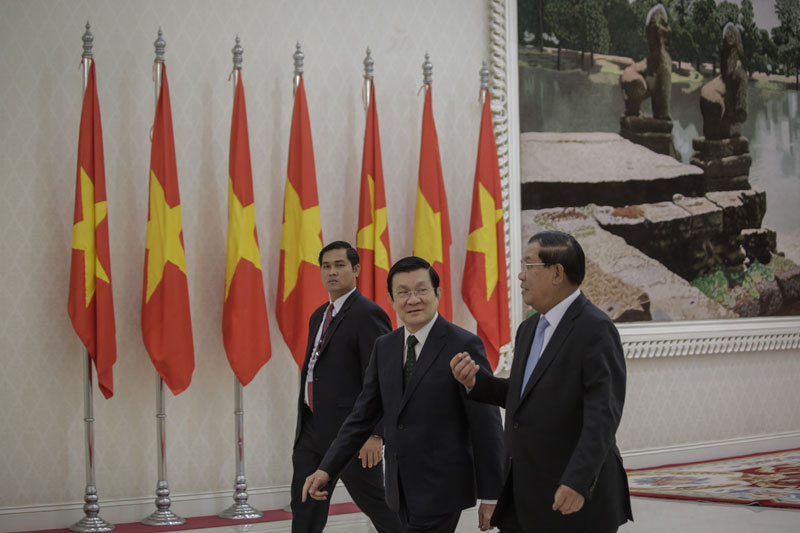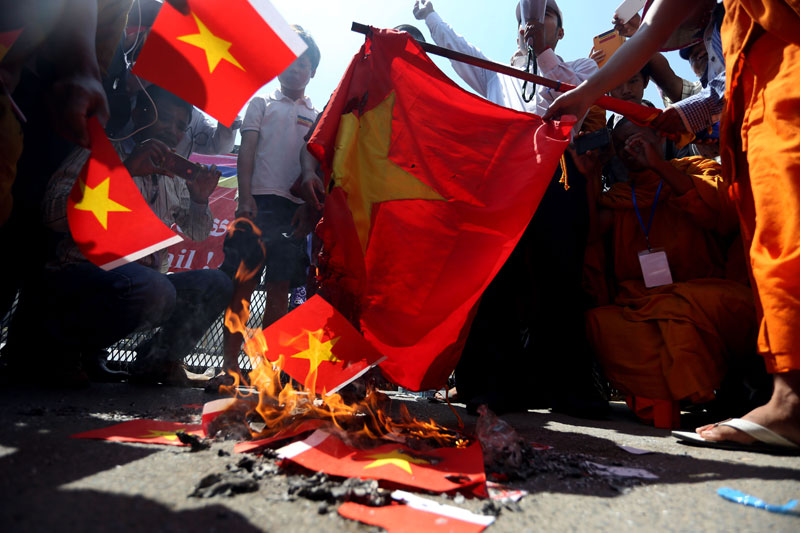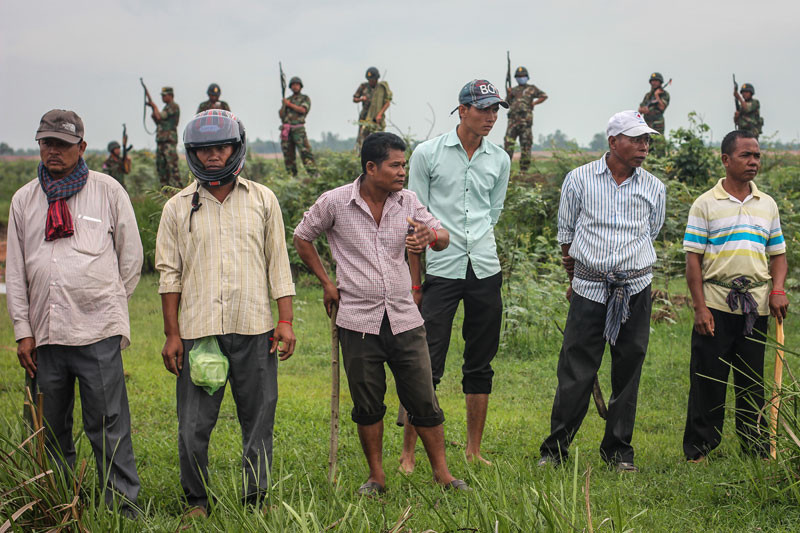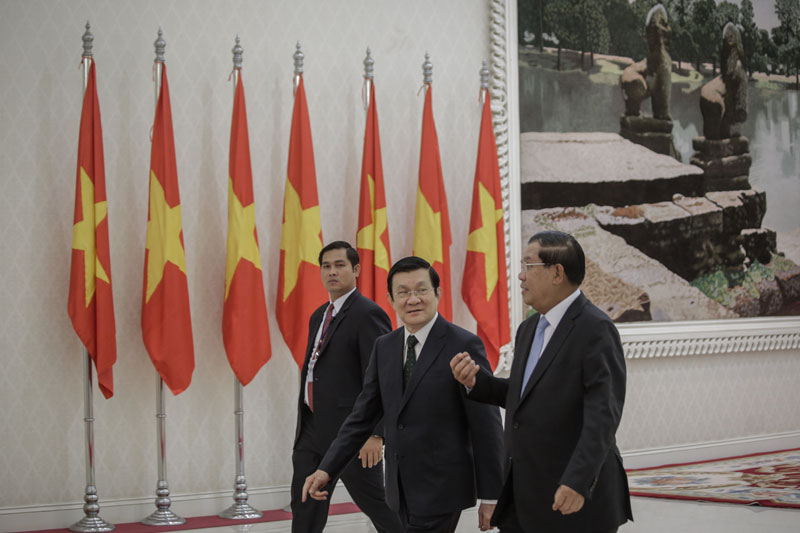Last week, Vietnamese Facebook user Bao Lam stopped by Prime Minister Hun Sen’s Facebook page to give him a piece of her mind.
“Cambodia eats the porridge then pisses in the bowl,” she wrote in Vietnamese, using an idiom from her country. “Vietnam has sacrificed both our blood and money to save the Cambodian people from genocide. Now Hun Sen is turning his back on Vietnam.”

“Cambodia will eventually be poisoned and exterminated” by China, she predicted.
Half an hour later, the prime minister responded to the comment, which had received no likes and came from an account that appeared to have been created in April.
“If you or your country has a problem with China, please solve it peacefully,” Mr. Hun Sen, who speaks fluent Vietnamese, wrote in English, apparently referring to Vietnam’s ongoing dispute with its northern neighbor over maritime territory in the South China Sea.
“Do not blame me and do not involve Cambodia to your country’s internal issue. Of course, I am faithful to my nation, my King and my own wife,” he wrote.
The conversation further deteriorated from there, with Ms. Lam saying the prime minister would not be perched in his “high chair” without Vietnamese help.
“May [I] ask if this is your own word or its from [your] leader’s suggestion to attack me?” Mr. Hun Sen retorted.
The vigor of Mr. Hun Sen’s responses—coupled with recent border tensions and simmering disputes over China’s maritime claims—suggest a dip in the government’s relations with its former minders in Hanoi, who installed Mr. Hun Sen’s administration after overthrowing the Khmer Rouge regime in 1979.
But analysts say his public positioning has as much to do with CPP pre-election showmanship as diplomatic maneuvering, even as Cambodia’s increasingly cozy relationship with China could spell longer-term tension.
The prime minister’s spat with Ms. Lam—the latest of several similar exchanges—echoed through the halls of diplomacy.
The Ministry of Foreign Affairs issued a statement on Sunday slamming Vietnamese citizens who “have committed the immoral acts insulting the leader of Cambodia” and asking Hanoi to “punish those people.”
On Wednesday, the Vietnamese government responded by distancing itself from the posts without promising any specific punishment for offending Facebook users.
“We do not agree with using the right of freedom of expression to insult someone or to break up traditionally good sentiment between people of both countries,” it said in a statement.
Meanwhile, officials from the two countries remain at loggerheads over a shared border that the opposition CNRP has long claimed is being pushed west by Vietnamese military and civilian incursions—a position that has won the party significant popular support.
A Joint Border Committee meeting between officials from both countries ended on Tuesday without a statement amid a dispute over “uti possidetis,” the legal principle that countries continue to possess the territory they held at colonial independence.
Vietnam is continuing to build outposts in several “white zones”—undemarcated areas that both countries have agreed to stay out of—along the border and has not responded to diplomatic requests to stop.

Opposition lawmakers and activists claim that farmers in border provinces continue to rent land to Vietnamese farmers, a practice that the prime minister banned in November.
Cambodia has also repeatedly refused to join Vietnam and other Asean neighbors in formally rebuking China’s claims in the South China Sea, with many analysts saying that Cambodia’s compliance has been bought by China’s abundant aid. A recent Reuters report on U.S.-China relations described Cambodia as “increasingly seen as a Chinese satellite.”
Government spokesman Phay Siphan, however, said Cambodia and Vietnam remained fast friends.
“Both sides have experience to solve problems since 1979,” Mr. Siphan said. “The neighboring countries always have some differences.”
Carl Thayer, an emeritus professor at the Australian Defense Force Academy in Canberra, said Vietnamese officials knew the difference between the prime minister’s public posturing and more serious backroom diplomacy.
“Vietnam is mature enough to view Hun Sen’s comments on Facebook as driven by domestic concerns, that is, playing on anti-Vietnamese sentiment,” he said in an email.
“I do not think it has resulted in any marked deterioration in state to state relations,” he added.
The prime minister’s social media presence is used to “recoup his image among the youth in Cambodia and to demonstrate that Hun Sen is in control.”

Political analyst Ou Virak agreed that the Facebook posts and border disputes were not indicative of a foreign relations impasse.
However, “I sense an increase in politicization of the border tension by both political parties,” he said of the CPP and CNRP.
“Growing popular calls for attention to be paid to border issues” have made it “an issue that they can no longer afford to avoid.”
The South China Sea dispute figures less prominently in the public consciousness, Mr. Virak said, and could be used by the CPP to highlight Cambodian independence.
“They’re going to play a semi-nationalist card,” he predicted, pointing to the prime minister’s Facebook comments as part of that trend.
John Ciorciari, a Cambodia scholar and associate professor at the University of Michigan’s Gerald R. Ford School of Public Policy, agreed that the Facebook posts were meant for a domestic rather than diplomatic audience, but said the issues raised by the posts were real.
“Hun Sen probably would not have chosen to antagonize Vietnam over the South China Sea absent real Chinese pressure, but his decision to do so reflects a recalibration driven both by domestic political and strategic calculations,” Mr. Ciorciari said in an email.
The prime minister “clearly sees a close relationship with China as his regime’s key international backstop as the CPP’s electoral support wanes. His former patrons in Hanoi lack China’s financial heft and diplomatic clout, and close ties to Vietnam are a domestic vulnerability Cambodia’s opposition leaders are keen to exploit,” he said.
“By siding with China so clearly on the Paracel and Spratly feuds, Hun Sen has made the prospect of a balanced foreign policy more difficult in the future.”
Hanoi resident Do Duc Anh, who went to Mr. Hun Sen’s Facebook page last week to criticize the premier’s stance on the South China Sea, said his post reflected his country’s mood.
“In Vietnam, I think people are very upset,” he said in a Facebook message. They are “disappointed due to Hun Sen’s behavior about [the] South China Sea problem.”
The 21-year-old gaming-website editor said he had no plans to stop badgering Mr. Hun Sen.
“I think I’ll post on his wall if I see something about Vietnam-Cambodia relationship or something else about ASEAN and China,” he said.




